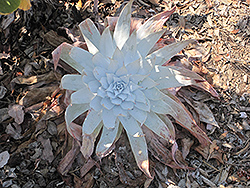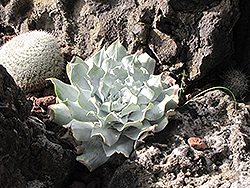It's all about ...
plants

Plant Height: 12 inches
Flower Height: 24 inches
Spread: 18 inches
Sunlight:
![]()
![]()
Hardiness Zone: 8b
Other Names: Chalk Live-forever, Chalk Lettuce
Description:
An outstanding succulent featuring a large rosette of chalky white leaves; coral spikes with red flowers in late spring; needs full sun on the coast but some shade inland; avoid watering in summer; great in containers, or in rock gardens
Ornamental Features
Chalk Dudleya features delicate spikes of red bell-shaped flowers rising above the foliage from late spring to early summer. Its attractive succulent pointy leaves remain white in colour with showy olive green variegation and tinges of silver throughout the season. The coral-pink stems are very colorful and add to the overall interest of the plant.
Landscape Attributes
Chalk Dudleya is an herbaceous perennial with tall flower stalks held atop a low mound of foliage. Its relatively fine texture sets it apart from other garden plants with less refined foliage.
This is a relatively low maintenance plant, and is best cleaned up in early spring before it resumes active growth for the season. It is a good choice for attracting butterflies and hummingbirds to your yard. It has no significant negative characteristics.
Chalk Dudleya is recommended for the following landscape applications;
- Mass Planting
- Rock/Alpine Gardens
- General Garden Use
- Groundcover
- Container Planting
Planting & Growing
Chalk Dudleya will grow to be about 12 inches tall at maturity extending to 24 inches tall with the flowers, with a spread of 18 inches. Its foliage tends to remain dense right to the ground, not requiring facer plants in front. It grows at a medium rate, and under ideal conditions can be expected to live for approximately 15 years. As an herbaceous perennial, this plant will usually die back to the crown each winter, and will regrow from the base each spring. Be careful not to disturb the crown in late winter when it may not be readily seen! As this plant tends to go dormant in summer, it is best interplanted with late-season bloomers to hide the dying foliage.
This plant does best in full sun to partial shade. It prefers dry to average moisture levels with very well-drained soil, and will often die in standing water. It is considered to be drought-tolerant, and thus makes an ideal choice for a low-water garden or xeriscape application. It is not particular as to soil pH, but grows best in sandy soils. It is somewhat tolerant of urban pollution. This species is native to parts of North America. It can be propagated by division.
Chalk Dudleya is a fine choice for the garden, but it is also a good selection for planting in outdoor pots and containers. With its upright habit of growth, it is best suited for use as a 'thriller' in the 'spiller-thriller-filler' container combination; plant it near the center of the pot, surrounded by smaller plants and those that spill over the edges. Note that when growing plants in outdoor containers and baskets, they may require more frequent waterings than they would in the yard or garden. Be aware that in our climate, most plants cannot be expected to survive the winter if left in containers outdoors, and this plant is no exception. Contact our experts for more information on how to protect it over the winter months.
This plant is not reliably hardy in our region, and certain restrictions may apply; contact the store for more information.

